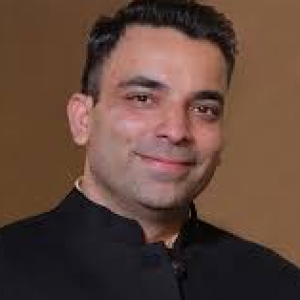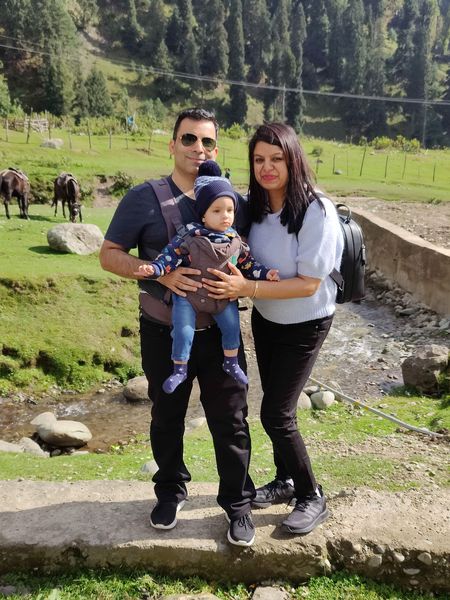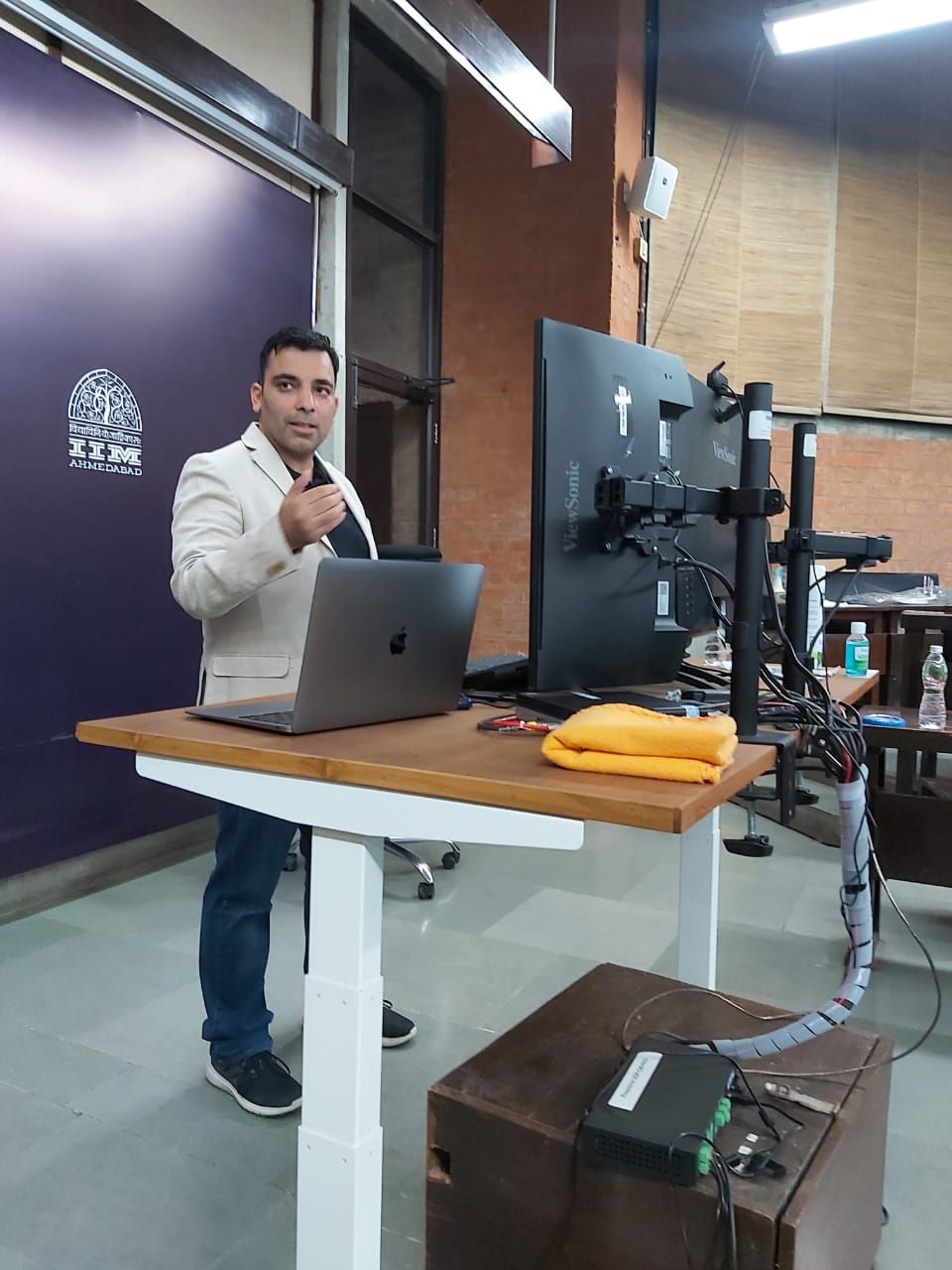Corporate Excellence: CEO at ApnaComplex -Amit Kumar Tyagi, PGP 2010
It takes years of grit, intent and determination to reach great heights whether it is professionally or personally. All that is true in the case of Mr. Amit Kumar Tyagi minus the long years. In a matter of just 10 years, Amit has managed to do what it takes people very many years, that is to become a CEO of a fast-paced growing organization. He is currently serving as the CEO at ApnaComplex, a pioneer in the field of apartment management.
ApnaComplex is India’s Leading Apartment Management ERP Solution offering Society Billing & Accounting, Apartment Security, Private Social Networking Platform for Society Members.
In this interview, Amit shares his journey, his experiences, learnings and much more.
Please tell us something about yourself.

I was born in Delhi but did my schooling in 7 different cities (as my father was in defence). I did B.Tech in Electronics Engg from IIT (ISM) Dhanbad and then worked in HCL for 3 years. Most of that time, I spent in the US, Taiwan and Japan working in the team of one of HCL’s customers. Post that I decided to pursue MBA and graduated from IIM Bangalore in 2010.
In addition to my professional work, I have been closely associated with IIMB Alumni Association (IIMBAA) for the last 5 years. It started with volunteering for one of the Anusmarans in Bangalore and now I am the Director of the Bangalore chapter of IIMBAA. And in this journey, I have been part of the team that has increased the engagement with Alumni multi-fold and launched great events like IIMBue (IIMB Leadership Conclave), CEO Conclave, CXO talk series, etc
On the home front, my wife is in a senior leadership position in Times Internet and we have a one-year-old son.
Your corporate journey is nothing short of inspiring, from passing out in 2010 to becoming a non-founder CEO in a decade’s time. How has the journey been?
It has been a very interesting journey – full of learnings. I have not only learned about what is needed to build successful businesses, but more interestingly, it’s been a discovery of who I am as a person.
I have been fortunate enough to lead teams across multiple functions. I think other than finance and HR, I have led all other departments at one point or another in the last decade. And that too across 4 diverse industries – IT, Semiconductors, Contact centres and SaaS businesses. But the most satisfying part has been that in all of the roles, I have been invited by one of the key stakeholders to join.
And the last 3.5 years, after I joined ApnaComplex, have been phenomenal. I joined them as CBO, got two rounds of HNI funding, one strategic investment, then one acquisition followed by another acquisition within 1 year. I became CEO in the middle of Covid-19’s first wave and had to figure out how to keep the company running in that uncharted territory of salary cuts, Work from home and market uncertainty. But with the support of my team, we have been able to bounce back strongly – we have been growing our customer base at 5X our pre-Covid pace, the team has expanded 4X and still growing, and we recently started our international foray with our first office in Dubai.
I think what has helped me are three things –
The first one is constant learning. I frequently revisit what I had learned at IIMB. You will be surprised that even though we learned a lot of things in the MBA, it’s only when you revisit the notes/ books when facing a challenge at work, you really appropriate what was taught. What I typically follow is a two step process – find a solution based on my specific problem and then apply the frameworks/ learnings from academics to check if I have missed anything. In addition, I also audit some of the online business courses by top B-schools in the world. I do not usually complete certificates for the courses, but just go through the lectures to assimilate what is being taught.
The second one is reaching out to the IIMB alumni network to get guidance whenever needed. Sometimes these are to know a market or best practices in an industry, but a lot more times, it’s to just bounce off ideas/ plans. One thing I learned is that when you are too engrossed in finding the solution to a problem, it’s easy to get tunnel vision and miss out on the larger picture. I think nothing exemplifies is like one instance that happened when I was learning to fly planes. One of the pilots was late for his trip and he wanted to take off quickly in his small two-seater plane. So, he did a very quick startup and takeoff checklist, taxied to the runway and asked ATC for clearance for takeoff. Fortunately, the ATC chanced to glance in his way and to his horror discovered that the plane was missing a whole left elevator! If the pilot had tried to take off, he would have crashed for sure, but he was so focussed on getting off the ground, he didn’t even realize he was missing a big part of his plane.
And the third one is to never quit. I think that’s one of the sayings in the startup ecosystem too – you have to stay alive long enough to get lucky! But in addition to never quitting, I would like to add “keep trying new ways to get to your goal”. There have been times when the situation has looked grim, but we have always been able to fight our way out of it because we kept trying multiple things till we succeeded. I read a good way of saying it in one of the books – The key skill of a CEO is his ability to focus and make the best move when there are no good moves.
What according to you are key skills required for a leadership role?
I have been in the CEO role for a few years only, but I have been fortunate enough that throughout my career I have been close to the leaders in the organizations I worked in. So, I was able to keenly observe and learn from leaders – both good and bad.
What I understood is that some of the things that we usually associate with leaders – smartness, ability to know the strengths and weaknesses of the people or good communication skills, etc. are table stakes. They are necessary, but not sufficient to build high-performing companies.
I believe there are 5 key skills that make a strong leader:
- Consistency in your behaviour
- A strong moral compass that guides you through tough decisions
- Empathy – Not just the ability to put you in the other person’s shoes, but willingness to do some action to help the other person
- A spine to stand up for your team
- Building a safe environment for people to disagree with you
The last one, “Building a safe environment”, is the one that is mostly overlooked. One thing I realized is that it’s very easy for people to agree with their bosses, but few would want to risk disagreement. But unless you have people in your team who speak their mind, all decisions can quickly go the “groupthink” or worse “CEO-think” way – a sure path to disaster. One way I found to cultivate this behaviour is that I tell my immediate reportees that one of the key areas of end-year evaluation would be how many times they have been able to change my mind about some key decision or prove my understanding of the market wrong with logical arguments & data. I track that regularly and have a quarterly discussion with them on this specific point. This has given them an opening and confidence to disagree with me without any hesitation.
Ultimately, a good leader needs to inspire trust in people – trust in not only in his ability to lead the company to success, but also that he will take care of people on the journey too. When the bond of trust is built, you will see that people go over and above the requirement to contribute. And that’s when you will see the team punch much above their weight, take on hardships without any demurs and really push towards the goal with all their might.
How do you keep your team motivated?
In industry, I have seen people believe that once you give a good salary, people will be self-motivated. But I have seen teams of amazing highly-paid individuals produce nothing and teams of apparently mediocre individuals produce miracles – and the difference has always been the level of team morale and motivation. The reality is that whether you are leading a small team or you are a CEO, you need to understand the motivations of each of your reportees and have a personalised approach to not only their career growth but also to the tasks given to each.
There are two kinds of motivations I have seen – competence driven and accomplishment driven. The former wants to be a master in their field (like a chief architect in a tech company) and the latter wants to keep challenging themselves to achieve more and more in everything they do. One needs to identify which members of a team are driven by which kind of motivation and accordingly create a career path for them.
Also, one has to realize that “output” is the real measure of motivation. No amount of “I am motivated” means anything if it doesn’t show up in output. So, we need to deploy systems to track and measure the real “output” of the teams and individuals.
A hobby that you like to follow in your spare time.
I have been a big fan of aviation. I used to fly Cessna 172’s and 152’s when I was in the US. In India, it’s not possible to fly planes as a hobby. So, I had taken up paragliding as a hobby and pre-Covid I used to do that in Pune.
But post-Covid, it’s been very difficult to pursue anything in aviation. So, I have started pursuing another interest of mine – history. And I would say this is a very interesting time for someone interested in Indian history. The archaeologists are applying newer technologies, like DNA analysis, to the sites in India and throwing up a lot of questions regarding the prevalent theories regarding Indian civilization. And the debate between the two sides is very fascinating to follow.
Any words of wisdom.
One very key thing I have realized is that as a CEO, you own the company culture. The culture starts from the top and flows downwards. No amount of HR training will imbibe a culture to an organization if the CEO himself does not practice it.
And it’s a tough job. As a CEO, you will have to be not only consistent in your behavior with what your culture is, but also ensure that your reportees also exhibit the same behavior.






